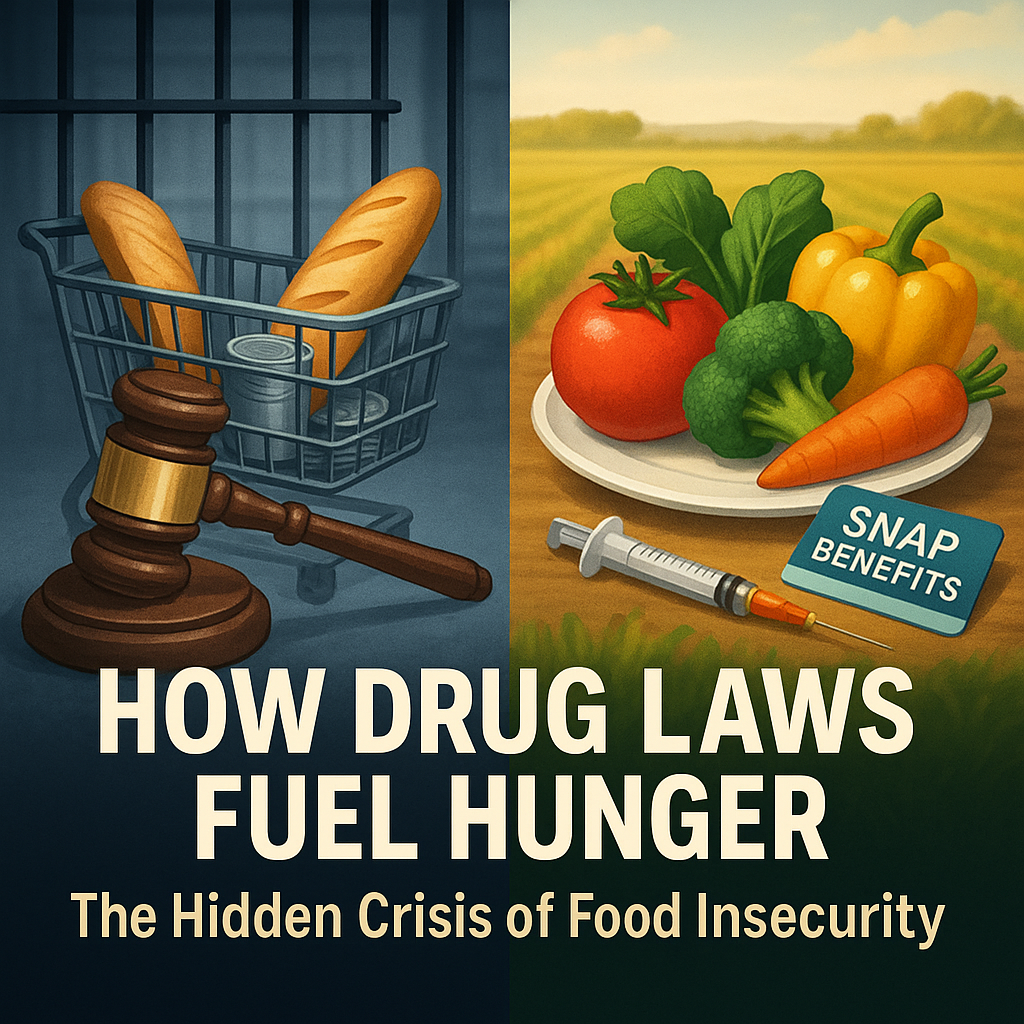The intersection of drug policy and food security is a complex and often overlooked issue with far-reaching consequences. While drug laws are primarily designed to regulate substance use and curb illicit markets, their enforcement has profound implications for food access, economic stability, and public health—particularly for marginalized communities. This article explores how drug prohibition, criminalization, and related policies exacerbate food insecurity, perpetuate poverty, and undermine social determinants of health.
1. The Link Between Drug Laws and Food Insecurity
A. Criminalization and Economic Exclusion
Drug laws disproportionately target low-income communities and people of color, leading to mass incarceration and lifelong barriers to employment, housing, and social benefits. In the U.S., for example:
- Over 1.1 million drug-related arrests occurred in 2020, mostly for personal possession, with Black individuals (13% of the population) accounting for 24% of arrests despite similar usage rates across racial groups 1.
- A felony drug conviction often results in lifetime bans from federal assistance programs like the Supplemental Nutrition Assistance Program (SNAP), exacerbating food insecurity among returning citizens 5.
Studies show that 70% of individuals with addiction issues experience food insecurity, as limited financial resources are diverted toward sustaining substance use rather than nutritious meals 3.
B. SNAP Restrictions and Hunger
The 1996 Personal Responsibility and Work Opportunity Act (PRWORA) imposed a lifetime ban on SNAP benefits for individuals with drug felony convictions, though states can opt out or modify this rule. Key findings:
- South Carolina remains the only state enforcing a full ban, while 25 others impose modified restrictions (e.g., mandatory drug treatment or testing) 5.
- Research indicates that expanding SNAP eligibility reduces substance misuse, as food assistance alleviates financial stress—a known trigger for risky drug use 4.
2. The War on Drugs and Social Determinants of Health
A. Employment and Housing Barriers
Drug testing and background checks systematically exclude formerly incarcerated individuals from stable jobs and housing:
- 21% of U.S. workers face pre-employment drug testing, yet less than 5.5% test positive—demonstrating the inefficacy of these policies in improving workplace safety 1.
- Without stable income or housing, individuals struggle to afford food, perpetuating cycles of poverty and recidivism 5.
B. Family and Child Welfare
Drug-related policies also disrupt family structures:
- Parents with drug convictions risk losing custody under family regulation systems (formerly "child welfare"), further straining household food security 1.
- Children in these households face higher risks of malnutrition and developmental challenges 3.
3. Public Health vs. Punitive Approaches
A. The Failure of Prohibition
The "drug war logic"—prioritizing criminalization over harm reduction—has worsened public health outcomes:
- The U.S. overdose crisis has claimed over 1 million lives since 1999, driven by an unregulated, fentanyl-contaminated drug supply 1.
- Countries adopting supervised consumption sites and heroin-assisted treatment report lower overdose rates, yet these measures remain underutilized in the U.S. 1.
B. Alternative Development Programs
Globally, initiatives like UNODC’s alternative livelihoods programs help illicit crop farmers transition to legal agriculture, improving food security in regions like Colombia and Myanmar 11. However, long-term investment is needed to ensure sustainability.
4. Policy Solutions for a Healthier Future
A. Repealing Harmful Bans
- The RESTORE Act (2023) proposes ending the federal SNAP felony ban, allowing returning citizens to access food aid pre-release 5.
- States should eliminate drug testing for welfare programs, as evidence shows these policies fail to reduce substance use while deepening poverty 1.
B. Expanding Harm Reduction
- Safe consumption sites and needle exchanges reduce overdose deaths and connect users to food and healthcare services 1.
- Universal SNAP access, including for those in recovery, can stabilize households and reduce relapse risks 4.
Conclusion: Rethinking Drug Policy for Food Justice
Food security and drug laws are inextricably linked. Punitive measures have failed to curb substance use while worsening hunger, inequality, and health disparities. A public health-centered approach—emphasizing decriminalization, economic support, and harm reduction—is essential to breaking this cycle.
Key Takeaways:
✔ Drug criminalization deepens food insecurity, especially for marginalized groups.
✔ SNAP bans and employment barriers perpetuate poverty and recidivism.
✔ Harm reduction and policy reform (e.g., RESTORE Act) offer viable solutions.

Be the first to share your thoughts!